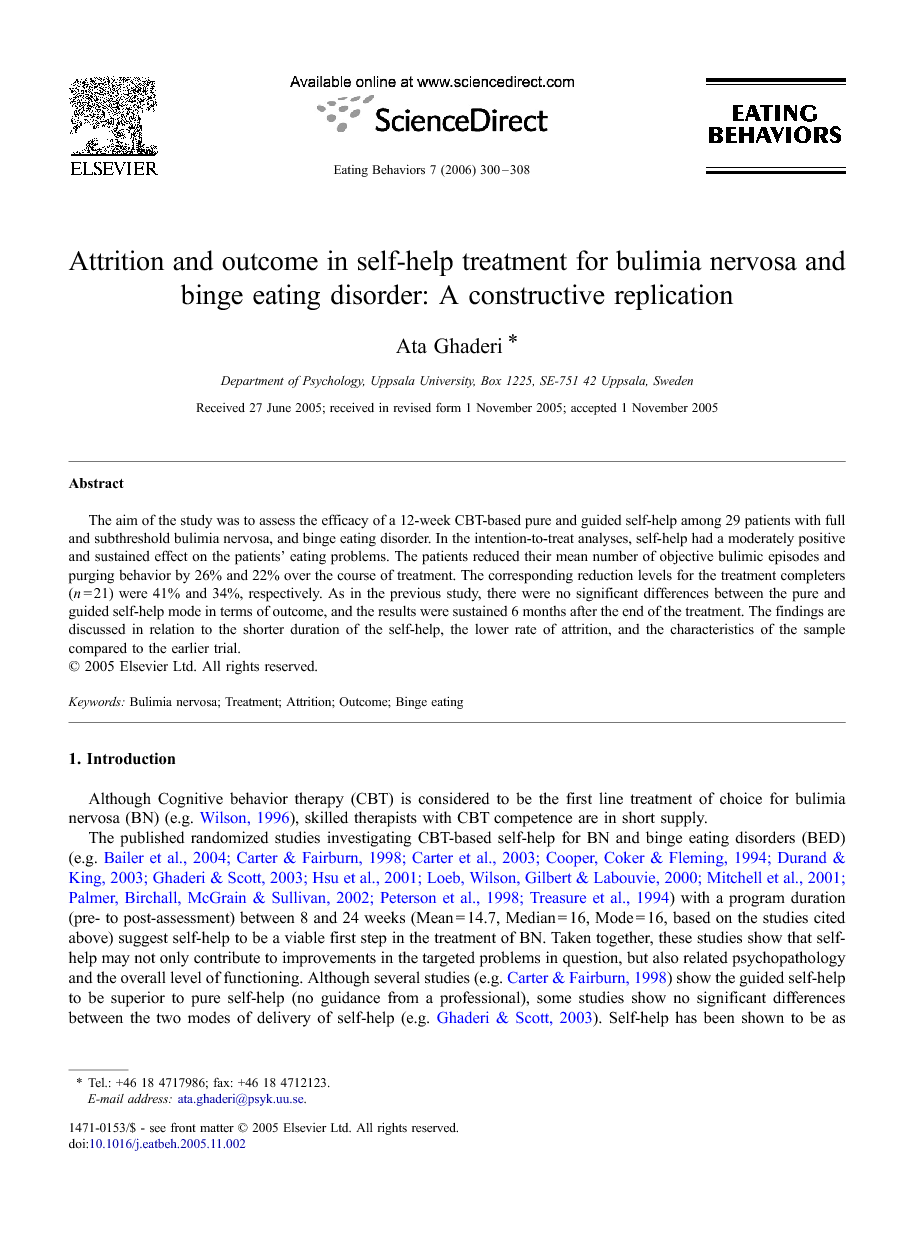The aim of the study was to assess the efficacy of a 12-week CBT-based pure and guided self-help among 29 patients with full and subthreshold bulimia nervosa, and binge eating disorder. In the intention-to-treat analyses, self-help had a moderately positive and sustained effect on the patients' eating problems. The patients reduced their mean number of objective bulimic episodes and purging behavior by 26% and 22% over the course of treatment. The corresponding reduction levels for the treatment completers (n = 21) were 41% and 34%, respectively. As in the previous study, there were no significant differences between the pure and guided self-help mode in terms of outcome, and the results were sustained 6 months after the end of the treatment. The findings are discussed in relation to the shorter duration of the self-help, the lower rate of attrition, and the characteristics of the sample compared to the earlier trial.
Although Cognitive behavior therapy (CBT) is considered to be the first line treatment of choice for bulimia nervosa (BN) (e.g. Wilson, 1996), skilled therapists with CBT competence are in short supply.
The published randomized studies investigating CBT-based self-help for BN and binge eating disorders (BED) (e.g. Bailer et al., 2004, Carter and Fairburn, 1998, Carter et al., 2003, Cooper et al., 1994, Durand and King, 2003, Ghaderi and Scott, 2003, Hsu et al., 2001, Loeb et al., 2000, Mitchell et al., 2001, Palmer et al., 2002, Peterson et al., 1998 and Treasure et al., 1994) with a program duration (pre- to post-assessment) between 8 and 24 weeks (Mean = 14.7, Median = 16, Mode = 16, based on the studies cited above) suggest self-help to be a viable first step in the treatment of BN. Taken together, these studies show that self-help may not only contribute to improvements in the targeted problems in question, but also related psychopathology and the overall level of functioning. Although several studies (e.g.Carter & Fairburn, 1998) show the guided self-help to be superior to pure self-help (no guidance from a professional), some studies show no significant differences between the two modes of delivery of self-help (e.g. Ghaderi & Scott, 2003). Self-help has been shown to be as effective as group CBT or Fluoxetine (e.g. Mitchell et al., 2001 and Treasure et al., 1996), although in one study (Bailer et al., 2004) self-help showed a slightly better effect among the completers, at follow-up, compared to group CBT. In stepped care models of treatment of eating disorders, it has been shown (Palmer et al., 2002) that patients initially offered guided self-help have a lower long-term drop-out rate. Although self-help is becoming incorporated in treatment guidelines (e.g. National Collaborating Centre for Mental Health, 2004) as a first step, it's efficacy and effectiveness is hampered by failure to engage in treatment (pre-treatment drop-out) and attrition. It has been shown that the length of time patients had waited between being referred to a service and the appointment date, to some degree explains pre-treatment drop-out (Bell & Newns, 2004). Less is known about attrition after the start of the self-help treatment. The principal aims of the present study, which is a constructive replication (Lykken, 1968) of a previous trial (Ghaderi & Scott, 2003), were to 1) investigate the efficacy of self-help in a 12-week program compared to the previous 16-week trial, and 2) to investigate the level of drop-out/attrition after shortening both the waiting time before receiving self-help, and the treatment period.
Would a shortening of the waiting and the treatment period contribute to enhanced focus in terms of a larger portion working through all the modules in the program compared to when the participants are reassessed after 16 weeks? Would a higher number of the participants relapse after a 12-week self-help program compared to 16 weeks? It was hypothesized that a shortening of the time waiting to receive active treatment, and a shortening of the treatment period itself, might decrease the drop-out and attrition, and not negatively affect the rate of relapse compared to the earlier trial.


